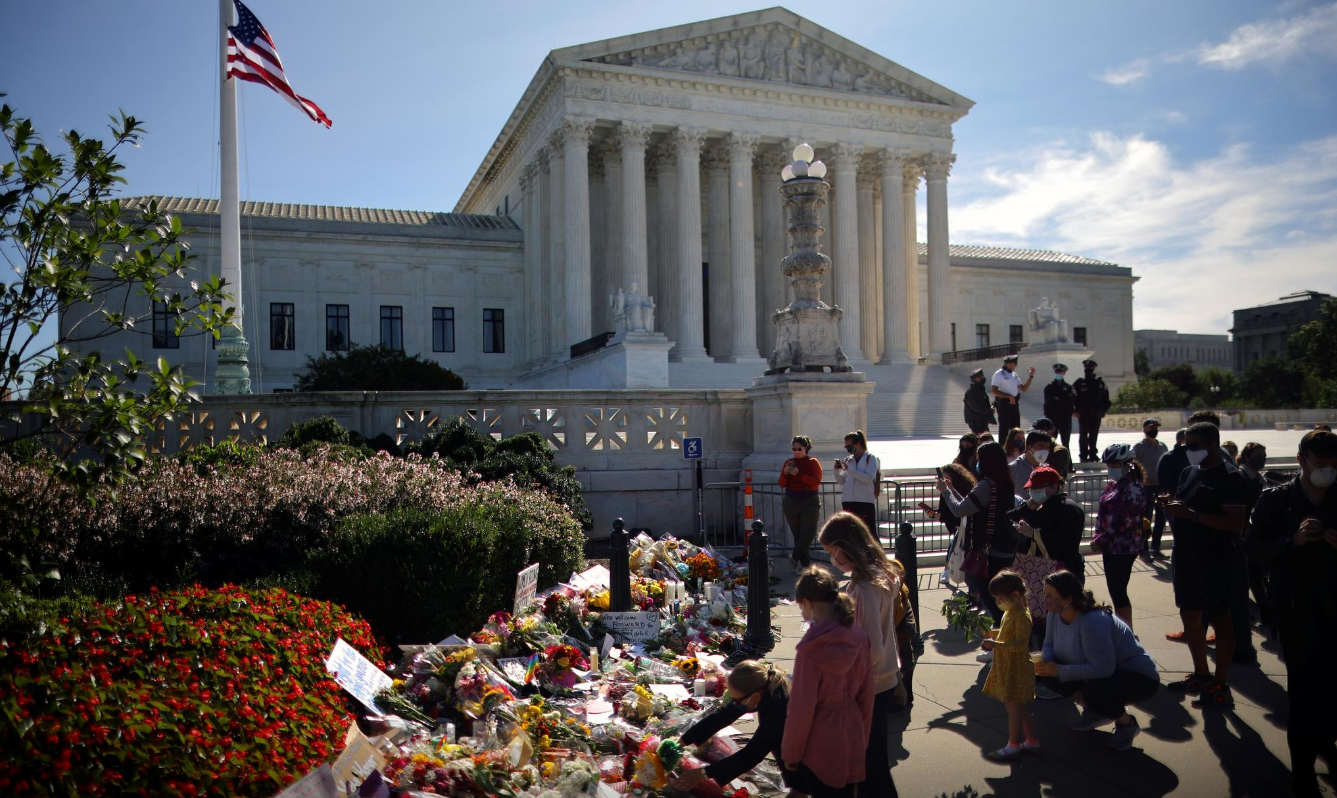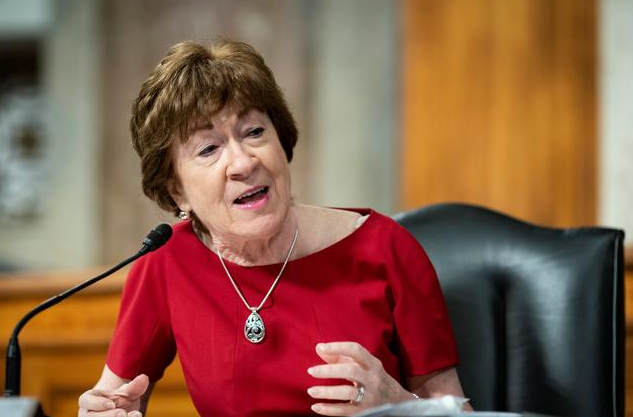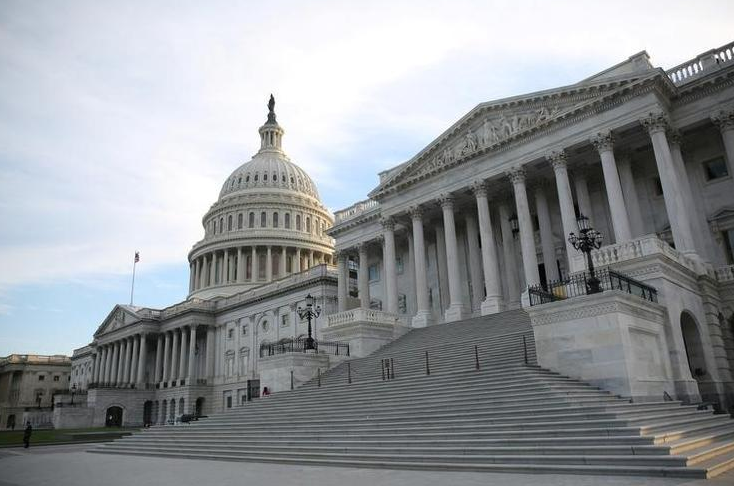The death of Supreme Court Justice Ruth Bader Ginsburg has triggered a Republican rush to appoint a conservative jurist for the vacancy, leaving incumbent Republican senators being challenged in the November race with a tough choice – either support President Donald Trump's push for a nomination before November, which has the potential of disrupting their campaigns, or boycotting the move in order to stand a better chance of winning the upcoming congressional election.
Trump said on Saturday he would promptly nominate a successor to Ginsburg, which corresponds with Republican Senate Majority Leader Mitch McConnell's promise to set forth a vote following the president's impending nomination. The stakes here are that the Senate is currently controlled by Republicans, but that could no longer be the case after the November election. If Trump does swiftly roll out a nomination to hedge against that prospect, his party will be able to cement a 6-3 conservative majority on the court while it still can.

A memorial alter in front of the U.S. Supreme Court following the death of Chief Justice Ruth Bader Ginsburg. /Reuters
A memorial alter in front of the U.S. Supreme Court following the death of Chief Justice Ruth Bader Ginsburg. /Reuters
But such a blitz nomination is not welcomed by some Republican senators who are facing the risk of being unseated. If a name is put forward by Trump in the coming weeks, these incumbents would have to choose between losing moderate voters or upsetting the conservative base, a dilemma they do not wish to encounter before the congressional race.
Having a solidified conservative Supreme Court is prone to the overturn of the 1973 Roe v. Wade decision that legalized abortion, which would reignite heated battles over one of the country's most polarizing issues on the campaign trail.
"This is an enormous political conundrum," Paul Sracic, a political science professor at Youngstown State University in Ohio, told Reuters. "You're going to lose someone in this," referring to segments of senators' home-state voters.
Trump's hedge is not without its necessity, as recent polls have indicated that Democrats are likely to retake the Senate, or at the very least split it in half with Republicans after the election.
Nonpartisan election trackers have placed nine incumbent senators at risk of losing their Senate seats, of which seven are Republicans and two are Democrats. If Democratic nominee Joe Biden beats Trump in the presidential election, Democrats would only need a net gain of three seats for a majority in Senate, as Biden's running mate Kamala Harris would be chairing the Senate and on hand to break 50-50 ties.
Susan Collins, a four-term Republican senator from Maine, said the Senate should hold off approving a nominee. She is facing the toughest reelction campaign in her career. In a New York Times-Siena College poll released earlier this week, she was found to be trailing her Democratic challenger by five points.
"In fairness to the American people, who will either be re-electing the President or selecting a new one, the decision on a lifetime appointment to the Supreme Court should be made by the President who is elected on November 3rd," Collins said on Twitter.

Senator Susan Collins, a Republican from Maine, speaks during a Senate Health, Education, Labor and Pensions Committee hearing on efforts to get back to work and school during the coronavirus disease (COVID-19) outbreak, in Washington, D.C., U.S. June 30, 2020. /Reuters
Senator Susan Collins, a Republican from Maine, speaks during a Senate Health, Education, Labor and Pensions Committee hearing on efforts to get back to work and school during the coronavirus disease (COVID-19) outbreak, in Washington, D.C., U.S. June 30, 2020. /Reuters
Not all Republicans in competitive races feel rattled by the nomination push like Collins does; some view it as a winning issue.
"There is a clear choice on the future of the Supreme Court between the well-qualified and conservative jurist President Trump will nominate and I will support, and the liberal activist Joe Biden will nominate," Senator Thom Tillis of North Carolina said in a statement.
Other Republicans in the Senate, who either are not contesting in the November race or have a decent chance of winning reelection, also have some concerns over whether to support a Senate vote on a Supreme Court Justice's confirmation before the elections.
Senator Chuck Grassley, a former chairman of the Judiciary Committee, was adamant in blocking former President Barack Obama's appointment for a vacancy left in February 2016. He said at the time that the decision to fill the vacancy should be made by whoever was elected president nine months later. He also confirmed in July that he would not have a confirmation hearing if it were up to him. But since he doesn't control the panel now, he said the decision is for the current chairman to make.
Senator Mitt Romney of Maine, an outspoken critic of Trump, has not signaled how he might regard an election-season confirmation push, but his established voting pattern indicates that he may not vote for the president's pick.
Senator Lisa Murkowski of Kentucky said Friday that she would not vote to confirm a Supreme Court nominee before Election Day. Murkowski has built a reputation as someone willing to cross party lines. She previously voted along with Collins against their party's failed attempt to repeal a key piece of health legislation the Affordable Care Act.

The U.S. Capitol Building is seen shortly before sunset in Washington, U.S. /Reuters
The U.S. Capitol Building is seen shortly before sunset in Washington, U.S. /Reuters
All these uncertainties are prompting Trump and McConnell to act sooner rather than later in whipping a Supreme Court nominee through the Senate. A special election in Arizona is also adding fuel to that urgency. Recent polls in the state have Republican Senator Martha McSally trailing Democratic challenger Mark Kelly by 20 points in polls. The winner of that contest would not have to wait until January 2 to be sworn-in like the rest of the senators and potentially could take office by early December.
Creating a bulletproof conservative majority in the Supreme Court could be a major achievement for the Republicans, because it would fundamentally shift the ideological balance of the court and such a shift has not happened for 50 years. Apart from abortion, many other important issues would be on the line.
The prospect of solidifying a conservative Supreme Court was so enticing that Republican senators might be willing to lose their majority to accomplish it amid potential voter backlash, Reuters cited an unnamed Republican senator as saying.